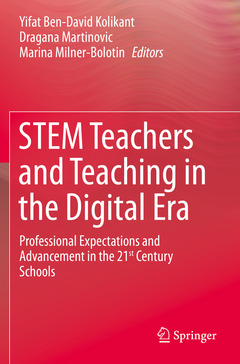STEM Teachers and Teaching in the Digital Era, 1st ed. 2020 Professional Expectations and Advancement in the 21st Century Schools
Coordonnateurs : Ben-David Kolikant Yifat, Martinovic Dragana, Milner-Bolotin Marina

This book brings together researchers from Israel and Canada to discuss the challenges today's teachers and teacher?educators face in their practice.
There is a growing expectation that the 21st century STEM teachers re?examine their teaching philosophies and adjust their practices to reflect the increasing role of digital technologies. This expectation presents a significant challenge to teachers, who are often asked to implement novel technology?rich pedagogies they did not have a chance to experience as students or become comfortable with. To exacerbate this challenge, the 21st century teachers function not only in a frequently?changing educational reality manifested by continuous reforms, but are also bombarded by often contradictory and competing demands from the legislators, administrators, parents, and students. How do we break the vicious circle of reforms and support STEM teachers in making a real change in student learning?This book is unique for at least three reasons. First, it showcases research situated in Israel and Canada that examines the challenges today's teachers and teacher?educators face in their practice. While the governments of both countries emphasize STEM education, their approaches are different and thus provide for interesting comparisons. Second, in addition to including research-based chapters, prominent scholars discuss the contributions in each of the book sections, problematizing the issues from a global perspective. Third, technology has a potential to empower teachers in this era of change, and this book provides the unique insights from each country, while allowing for comparisons, discussing solutions, and asking new questions.
This book will be of interest to all involved in STEM teacher education programs or graduate programs in education, as well as to educational administrators interested in implementing technology in their schools.
Marina Milner-Bolotin is an Associate Professor in science education in the Faculty of Education at the University of British Columbia, Vancouver, Canada. She holds a M.Sc. in theoretical physics from the Kharkov National University in Ukraine. She also holds M.A. and Ph.D. degrees in mathematics and science education from the University of Texas at Austin in 2001. At UT Austin, she investigated how project-based instruction in physics courses for future elementary teachers affected their interest in science and their ability to do and teach science. She specializes in science and mathematics education and science outreach. She studies how technology can be used in teacher education to prepare mathematics and science teachers who will be able to engage 21st century students in meaningful learning. Her work has appeared in international peer-reviewed research journals, scientific books, conference proceedings, seminars, and workshops. Since 1993, she has been teaching science and mathematics in Israel, USA, China, and Canada to elementary students to university undergraduates in science programs, and to pre-service and in-service teachers. She has led many professional development activities for science in-service and pre-service teachers and university faculty. She is an author of an introductory physics textbook used by thousands of students. Before joining UBC, she was faculty member at Ryerson University in Toronto, Ontario. She has received numerous research and teaching awards and served on the Executive Board of Canadian and International science education associations. To learn more about her research and publications, visit her web site.
Yifat Ben David Kolikant is an Associate Professor in the Seymor Fox School of Education, Hebrew University of Jerusalem. Her academic work is devoted to theorizing learning, teaching, and schooling in the age of globalization and digitalism, an age characterized b
Deepens the discussion on the potential and the mediation of technology in teaching STEM with technology
Opens up new research venues for emergent STEM teaching possibilities in the digital era
Covers a variety of themes, such as empowering teachers as researchers, leaders, and co-creators of knowledge
Date de parution : 06-2021
Ouvrage de 324 p.
15.5x23.5 cm
Disponible chez l'éditeur (délai d'approvisionnement : 15 jours).
Prix indicatif 147,69 €
Ajouter au panierDate de parution : 02-2020
Ouvrage de 324 p.
15.5x23.5 cm
Disponible chez l'éditeur (délai d'approvisionnement : 15 jours).
Prix indicatif 147,69 €
Ajouter au panier


